The photographs, stories, and videos gathered at the Chinese American Experiences Mass. Memories Road Show are now available online for research.
Organized by the Chinese Historical Society of New England (CHSNE), the event was held at the Pao Arts Center in Boston’s Chinatown neighborhood on Saturday, June 2, 2018. Collaborating partners included the Greater Boston Chinese Cultural Association, the Boston Chinatown Neighborhood Center, Greater Malden Asian American Community Coalition, and Quincy Asian Resources, Inc. The event was made possible in part with support from CHSNE’s 2018 year-round sponsors–Tufts Medical Center, South Cove Community Health Center, and the National Park Service–as well as generous donations from Jook Sing Cafe, Crave-Mad for Chicken, and MEM Tea Imports.
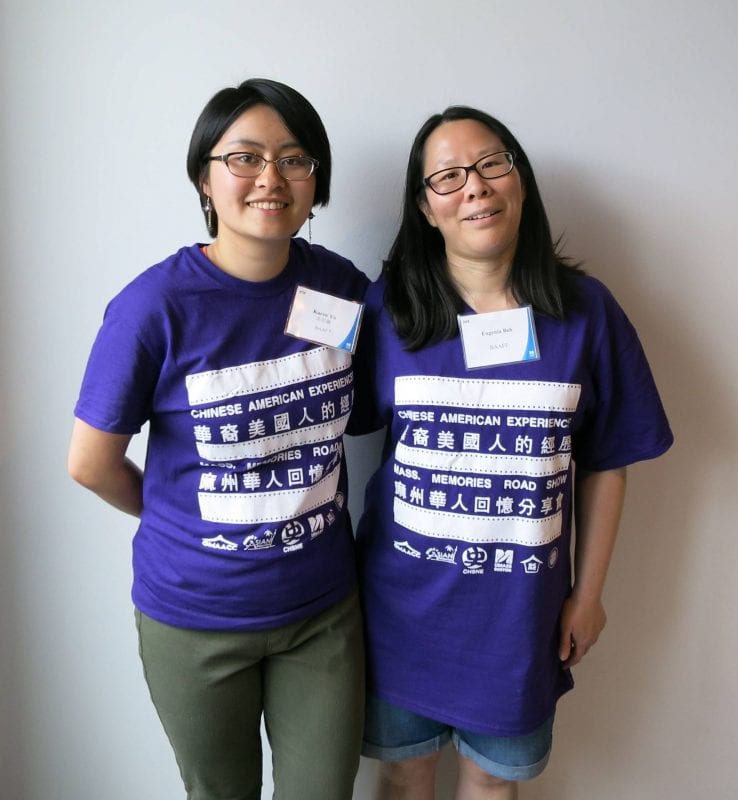
Karen Yu and Eugenia Beh volunteered at the Chinese American Experiences Mass. Memories Road Show on June 2, 2018.
More than two dozen volunteers, including eight Chinese language translators, joined a team of UMass Boston staff members, public history graduate students, and “Roadies” to welcome 130 adults and children from the greater Boston area to the event.
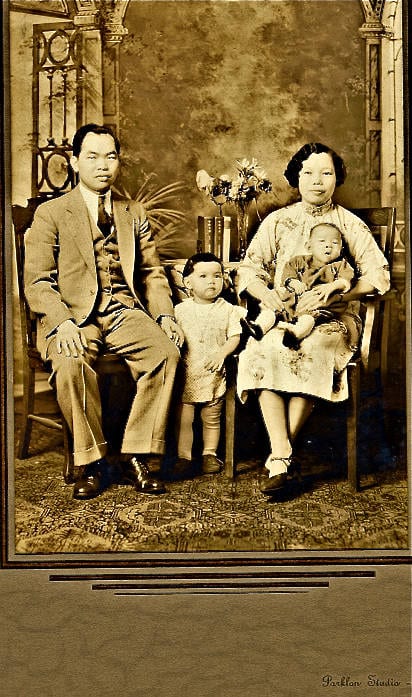
‘Edwin Keyseu Chin family of Charlestown, Massachusetts, 1934. This photo was taken in a studio in Boston, Massachusetts. My dad Edwin Keyseu Chin, 30, and my mom Mary Gee, 24, my oldest sister Helen, 1.5, and my oldest brother Tom, 6 months. This is two years after mom came to Boston from Zoishan, China and married Dad. They operated a hand laundry in Charlestown, Massachusetts near City Square in the shadow of the elevated train tracks. Charlestown at the time was mostly Irish. Pictured, from back to front, left to right: my father Edwin Keyseu Chin, my mother Mary Gee Chin, my sister Helen Chin, and my brother Tom Chin.’ Contributor: David Chin.
Participants shared over 200 photographs and videos documenting their connections to Chinese American communities in Massachusetts and beyond. A number of images depict family members before they immigrated from China to the United States and the majority of the materials document the homes, businesses, and community organizations that Chinese American families established in the greater Boston area in the 20th century.
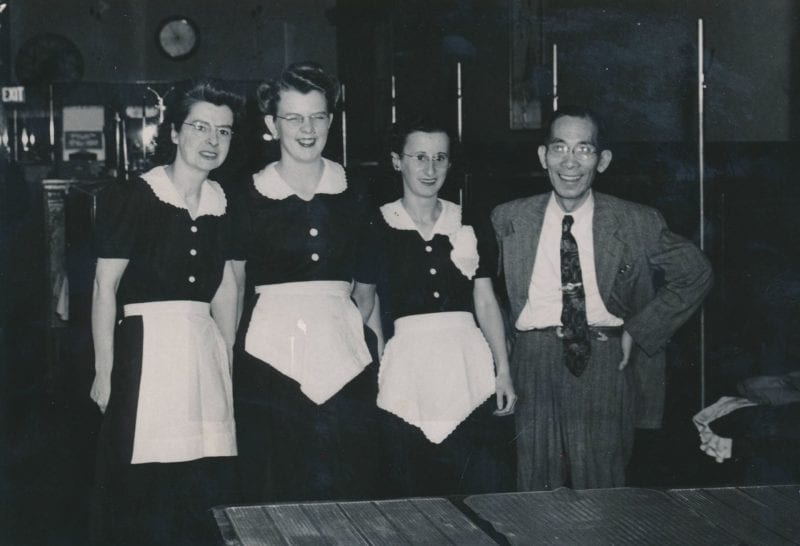
‘My father and his staff, 1940. My father owned the Jade Restaurant in Malden. He purchased it during WWII and expanded it. He had several wait staff and kitchen staff. Pictured, from left to right: Maude McKenzie, the wait staff at Jade Restaurant, my father Dun Shai Jeong. Location: Jade Restaurant.’ Contributor: Diana Jeong.
Domestic interiors and street scenes of Boston’s Chinatown neighborhood are included in the collection. Informal snapshots and formal family portraits depict Chinese Americans living and working in surrounding cities such as Malden and Quincy, as well as suburban towns such as Wayland and Lexington.
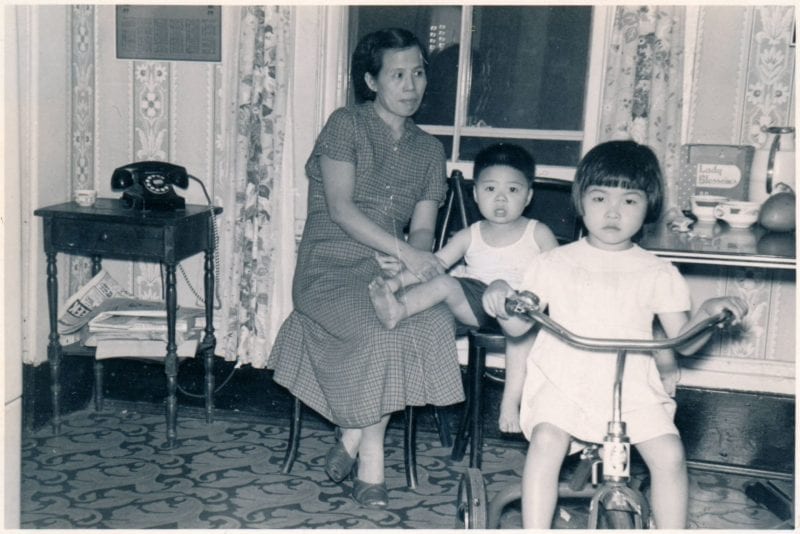
‘Inside 116 Hudson Street circa 1954. This was taken inside 116 Hudson Street, 2nd floor, in the 1950s when Chinese-American (Taishanese American) families formed for the first time. Settling on Hudson Street until Hudson Street was demolished in 1963 for the Southeast Expressway ramp. It was a traumatic displacement for the immigrants who had been displaced through immigration, revolution, and war. Pictured, from left to right: May Soon Yee, Albert Yee, and Cynthia Yee.’ Contributor: Cynthia Yee.
Some contributors further shared stories of adoption by American parents and their experiences forging community connections among Asian adoptees.
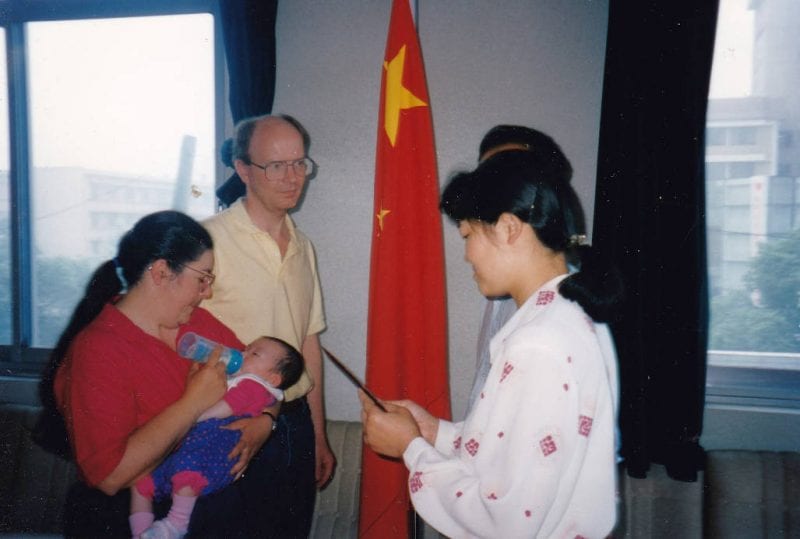
‘Moment of conception, official adoption ceremony, May 1995. This photo depicts the official moment when I was adopted. I am being held and fed a bottle as a seven-month year old baby by my mom, Marjorie, while my dad, Doug, looks on. Two government officials are holding some certificate. A Chinese flag is in the background, representing the place and national affiliation. I would like to know the exact location, date, time, but I just didn’t ask my parents this morning.’ Contributor: Laura Xiang Williams.
The collection documents participants’ efforts to preserve Chinese identity and cultural heritage as well as their contributions to American institutions and traditions. Many contributors also emphasized memories of their personal accomplishments and those of their children finding success in the United States through educational and professional achievements.
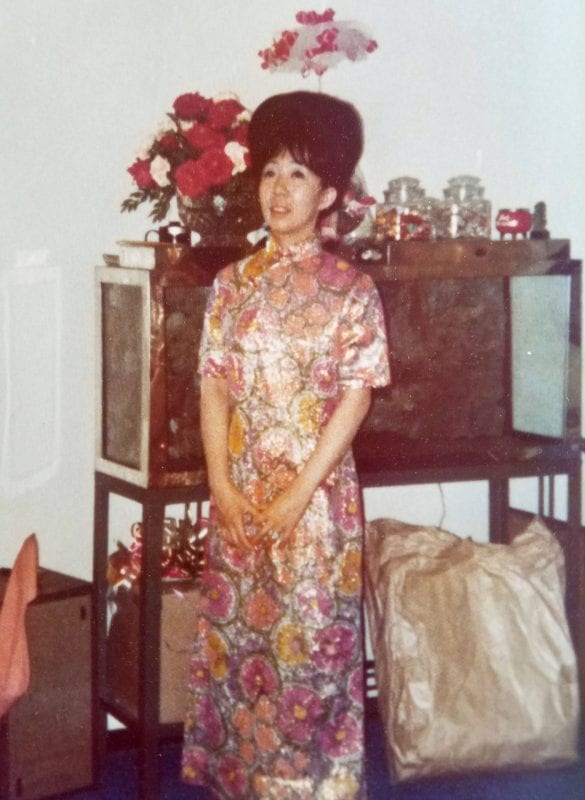
‘Modern take on traditional Chinese dress. My grandmother Mary Soo Hoo is wearing a traditional Chinese dress, ‘cheongsam’, that has been modernized to the 1970s.’ Contributor: Maliya Soo Hoo.
Browse the Chinese American Experiences Mass. Memories Road Show collection.
The Mass. Memories Road Show is a statewide digital history project that documents people, places and events in Massachusetts history through family photographs and stories. In partnership with teams of local volunteers, we organize public events to scan family and community photographs and videotape “the stories behind the photos.” The images and videos are indexed and incorporated into an online educational database. Since its launch, the project has gathered more than 10,000 photographs and stories from across the state. It is supported in part by the Patricia C. Flaherty ’81 Endowed Fund at UMass Boston.
University Archives & Special Collections in the Joseph P. Healey Library at UMass Boston was established in 1981 as a repository to collect archival material in subject areas of interest to the university, as well as the records of the university itself. The mission and history of UMass Boston guide the collection policies of University Archives & Special Collections, with the university’s urban mission and strong support of community service reflected in the records of and related to urban planning, social welfare, social action, alternative movements, community organizations, war and social consequence, and local history related to neighboring communities. To learn more, visit blogs.umb.edu/archives.